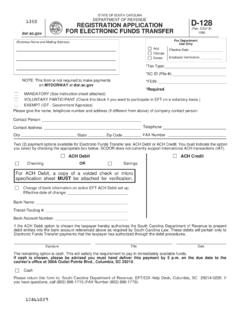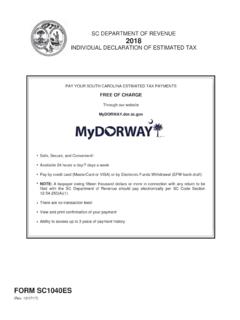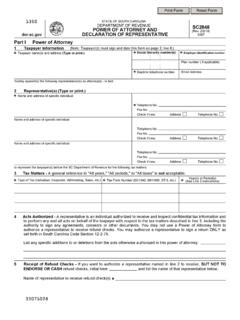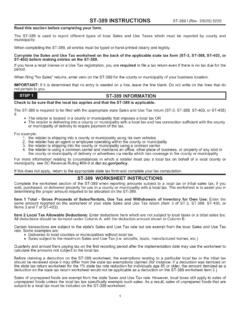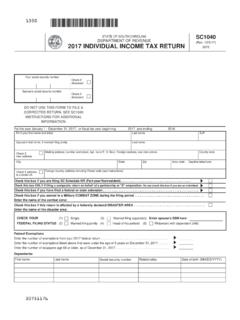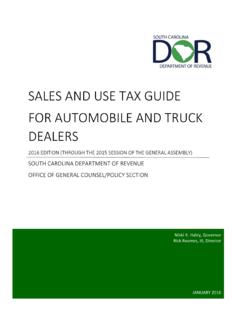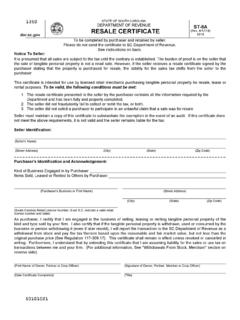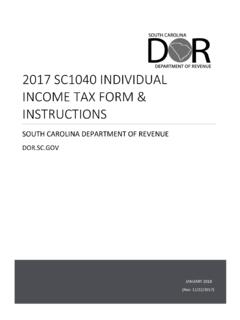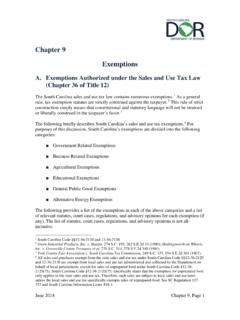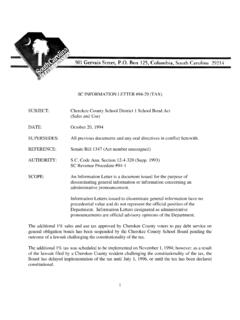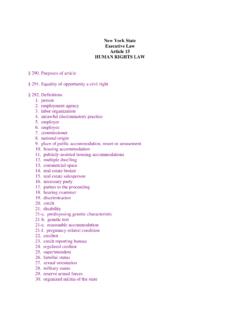Transcription of STATE OF SOUTH CAROLI NA DEPARTMENT OF REVENUE
1 STATE OF SOUTH CAROLINA DEPARTMENT OF REVENUE 300A Outlet Pointe Blvd., Columbia, SOUTH Carolina 29210 Box 12265, Columbia, SOUTH Carolina 29211 SC REVENUE RULING #16-11 SUBJECT: Nexus Creating Activities for Income Taxes (Income Tax) EFFECTIVE DATE: Applies to all periods open under the statute, unless otherwise stated in the Introduction. SUPERSEDES: SC REVENUE Ruling #03-4 and all previous advisory opinions and any oral directives in conflict herewith. AUTHORITY: S. C. Code Ann. Section 12-4- 320 (2014) S. C. Code Ann. Section 1-23-10(4) (2005) SC REVENUE Procedure #09-3 SCOPE: The purpose of a REVENUE Ruling is to provide guidance to the public. It is an advisory opinion issued to apply principles of tax law to a set of facts or a general category of taxpayers. It is the DEPARTMENT s position until superseded or modified by a change in statute, regulation, court decision, or another DEPARTMENT advisory opinion.
2 Introduction: Nexus is the minimum connection or contact between a taxpayer and a STATE sufficient to subject the taxpayer to the taxing jurisdiction of a STATE . The Due Process and Commerce Clauses of the United states Constitution, 15 381 (Public Law 86-272) and other federal statutes provide limitations on a STATE s powers to tax out-of- STATE businesses. Over the years, courts have provided limitations and guidelines in determining whether certain activities create nexus with a taxing STATE . For example, see Quill Corp. v. North Dakota 504 298 (1992), Wisconsin DEPARTMENT of REVENUE v. William Wrigley, Jr., Co., 505 214 (1992), Burger King Corp. v. Rudzewicz, 471 462 (1985), Helicopteros Nacionales de Columbia, v. Hall, 466 408 (1984), Complete Auto Transit, Inc. v. Brady, 430 274 (1977), and Geoffrey, Inc. v. SOUTH Carolina Tax Commission, 313 15, 437 13 (1993) cert.
3 Denied 510 992 (1993). 2 The purpose of this advisory opinion is to update written guidance from the DEPARTMENT concerning nexus creating activities for income tax purposes. For additional information in determining whether Public Law 86-272 protects certain activities from SOUTH Carolina taxation see SC REVENUE Ruling #97-15. This document reflects the DEPARTMENT s official position regarding income tax nexus at the time of its issuance. Since developments in this area are constantly taking place, any response is subject to change due to a future statute, regulation, court decision, or advisory opinion. Any change in SOUTH Carolina s position as set forth in this document that is not the result of a court case or change in statute or regulation will be prospective. Any change resulting from a court case will apply to all periods open under the statute unless the court states otherwise, and any change resulting from a change in statute or regulation will be applicable as of the effective date established by the General Assembly.
4 This document covers the following categories: A. General Activities B. Registration with STATE Agencies/Departments C. Ownership/Leasing of In- STATE Property D. Ownership Interest of In- STATE Pass-Through Entities E. Licensing Intangibles F. Employee Activities Sales Related G. Employee Activities Non-Sales Related H. Activities of Unrelated Parties I. Distribution and Delivery J. Financial Activities/Transactions K. Transactions with SOUTH Carolina Printers L. Cloud Computing or Software as a Service (SaaS) Transactions M. Internet-Based Activities Questions concerning the existence of nexus with SOUTH Carolina should be directed to the DEPARTMENT s Nexus/Discovery Section at 803-898-5235 or 803-898-5695. Qualifications to Responses: Each response is based upon the specific facts described in the question and the following assumptions: Each specific question by itself was the only possible nexus creating activity or relationship a business has in SOUTH Carolina1; and, 1 Even though some questions specifically STATE that the activity represents the business s sole activity in SOUTH Carolina, all other questions also represent the business s sole activity in SOUTH Carolina, whether or not such is specifically stated.
5 3 The activities described are not de minimis unless the question or answer specifically states otherwise. A yes response indicates the activity or relationship will, by itself, create nexus with SOUTH Carolina. A no response indicates the activity or relationship will not, by itself, create nexus with SOUTH Carolina. However, it is important to note that a combination of several different de minimus activities or relationships, even if each, by itself, does not create nexus, may create nexus with SOUTH Carolina. Caution: Since a thorough review of the facts and circumstances of each taxpayer s situation is required in order to make a nexus determination, any variance from the facts stated in a question, any additional facts not stated in a question, or additional facts not considered in answering the questions below may change the answer set forth in this document. Each response refers only to income tax nexus.
6 Activities that create nexus for income tax purposes differ somewhat from those that create nexus for other tax purposes. Further, the DEPARTMENT did not address the imposition of any license fee, registration or filing requirements, withholding responsibilities, or the consequences of unity and foreign commerce. References used in preparation of this document include: 1. Wisconsin DEPARTMENT of REVENUE v. William Wrigley, Jr., Co., 505 214 (1992); 2. SC REVENUE Ruling #97-15, an advisory opinion providing guidance for determining whether Public Law 86-272 protects certain activities from SOUTH Carolina taxation; 3. SC REVENUE Ruling #08-1, an advisory opinion providing examples that show activities or relationships that will not, by themselves, create income tax nexus with SOUTH Carolina; 4. SC Private Letter Ruling #94-8, an advisory opinion concluding that a company s leveraged leases of five aircraft to commercial airlines were de minimis when it had three landings in SOUTH Carolina and 58,722 landings everywhere for the tax year.
7 Therefore, the company did not have nexus in SOUTH Carolina; 5. SC Private Letter Ruling #95-2, an advisory opinion addressing the appropriate sourcing of nonresident limited partners income in a limited partnership organized under Delaware law for the purpose of pooling resources in order to maximize investments in stocks, securities, and other intangible assets (including limited partnerships) for its own account. Based upon the facts, the nonresident partnership was not considered to carry on a business in SOUTH Carolina since its income was solely from its purchase and sale of property for its own As a result, the income generated by the partnership was not considered SOUTH Carolina source income to its nonresident limited partners. Note, the advisory opinion did not address the taxation of the general partner, an S corporation, authorized to do business in SOUTH Carolina and maintaining an office in SOUTH Carolina; 2 See SC Code Section 12-6-1720(1)(c).
8 4 6. SC Commission Decision #92-58, a decision distinguishable from SC Private Letter Ruling #95-2, wherein it was determined that an S corporation incorporated under SOUTH Carolina law for the sole purpose of investing in stocks, bonds, real estate, and partnerships was not merely an investment vehicle deriving income solely by reason of the purchase and sale of property for its own account. The S corporation was a business with significant fee income from financial advising, deal making, and financial contracts. As such, the gains from the disposition of intangible assets and the interest income were derived from property connected with the S corporation s business and were apportionable, and the dividend income was allocated to the shareholders domicile outside of SOUTH Carolina; and 7. Specific SOUTH Carolina income tax laws cited in the notes, , SC Code Sections 12-6- 555 (persons contracting with a commercial printer) and 12-6- 4920 (interstate motor carriers required to file).
9 5 A. General Activities YES NO 1. The out-of- STATE corporation is doing business in SOUTH Carolina. 2. The out-of- STATE corporation makes sales to customers in SOUTH Carolina by means of an 800 telephone order number and advertises in SOUTH Carolina. 3. The out-of- STATE corporation is listed in the local telephone books of cities in SOUTH Carolina. The phone is not answered in SOUTH Carolina. 4. The out-of- STATE corporation uses local phone numbers in SOUTH Carolina, which are forwarded to the corporation s headquarters located in another STATE . 5. The out-of- STATE corporation maintains a bank account at a bank located in SOUTH Carolina. 6. The out-of- STATE corporation provides consulting services in SOUTH Carolina during the year. The services are not de minimis. 7. The out-of- STATE corporation, through a third party, provides warranty services on goods sold in SOUTH Carolina.
10 Note: If not de minimis and if the services are conducted on behalf of the out- of- STATE corporation Generally, services will be considered to be conducted on behalf of the out-of- STATE company if that company contracts for or controls the services. 8. The out-of- STATE corporation sends catalogs to residents in SOUTH Carolina. 9. Does SOUTH Carolina have a de minimis standard? Note: SOUTH Carolina has a de minimis standard and follows the principles defined by case law. See Wisconsin DEPARTMENT of REVENUE v. William Wrigley, Jr., Co., 505 214 (1992), SC REVENUE Ruling #97-15, SC Private Letter Ruling #94-8, and SC Code Section 12-6-4920. 10. Does SOUTH Carolina conform to the Multistate Tax Commission s Nexus Bulletin 95-1 Computer Company s Provision of In- STATE Repair Services Creates Nexus? Note: SOUTH Carolina has not adopted MTC s Nexus Bulletin, but SOUTH Carolina generally considers services conducted by a third party to be on behalf of the out-of- STATE company if that company contracts for or controls the services.
